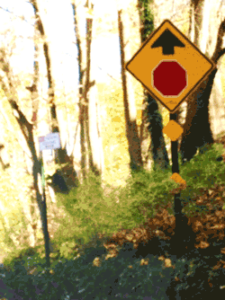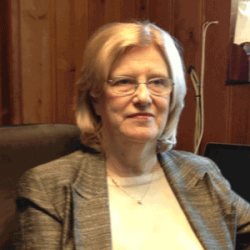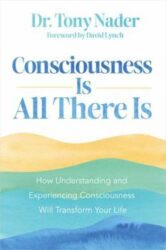Messages from Nature: Push Through vs. Stop Now

How many times have you felt tired and thought that if you could just push your way through to get the last hour of work done, you can rest after? How often do you caffeinate in order to push through the work day? ”Pushing through” has become an American modus operandi. Whether it’s going to work with a bad cold or gritting our teeth in a bad relationship, a strange stoic ethic has pervaded our cultural perspective which dictates that it is not only alright—but even preferable—to force our way through something. But is it intelligent and healthy to push through the discomfort, pain, or weariness?
Listening to Mother Nature?
When you are cooking and don’t realize that the pot handle is too hot to hold, a sudden burning sensation warns you to let go. When you’re walking down the street and a cold wind seeps into your neckline making you feel chilled, you turn up your collar. When your bladder yells, “Get to the bathroom asap!” you follow that order from your body. All of these are examples of how we pay attention to Mom Nature because, frankly, she knows what’s best.
Our consciousness flows through our attention to the burning sensation or chill or pressure in our bladder alerting us that there is a need to be addressed. This is a brilliant survival mechanism that’s built right into our bodies and minds. If we really learn to listen to these signals, we find that our health and well-being improve. But sometimes compelling thoughts to ignore the signals overcome us, resulting in bad choices. When this happens frequently or over a long period of time, our health deteriorates.
When we don’t listen
Overeating at Thanksgiving dinner, staying up extra late to watch a movie or finish a book, wearing those shoes that pinch—these are mild examples of overextending ourselves; we are usually aware that pursuing that course isn’t the best idea, and we pay for these choices with some discomfort. But we also can ignore Nature to such an extent that we end up with a disease like diabetes or hypertension, with exhaustion, or even with physical harm. “That man is not good for you,” our friends say, and we know that it is true, but then we think if we just wait it out long enough then things will improve. “That job is stressing you out,” our families tell us, and we know they are right, but we worry about money so we decide to hold on to it just for a while more.
The ideas that compel us to override Nature’s messages may have their root in something out-of-whack in our body. Stress—an imbalance on the chemical, muscular, neurological or other level of the physical body—is caused by some overwhelming experience or trauma mentally or physically. It is this physiological stress that distorts the clarity of thinking and decision making in the mind, preventing us from naturally behaving in the most life-sustaining way. It is stress and fatigue that give rise to self-doubt, clouding our intuition and coherent thinking ability. It is stress and fatigue that make us fearful, anxious, or depressed, all of which may further distort our ability to make right decisions.
Stepping on the brakes
The Transcendental Meditation technique is a natural antidote to stress and fatigue, and, even better, creates resistance to building up more. When we pressure ourselves to do more than we should, we may think we are doing the responsible thing, but in reality the effect will be quite the opposite. When a woman heeds the call from Mother Nature to slow down and rest, she takes care of herself. Using TM, her mind will turn within to a state of deep restful alertness. At that time, the body settles to a state of deep relaxation, eliminating stress and tiredness, and restoring much-needed balance, energy, focus and clear thinking that had been lost. One might feel that she is taking time away from that which is pressing, but in fact she is simply adding that which is essential to effective achievement without doing damage to herself. When we need to get an arrow to a target, we don’t run through the field and plunge it in; quite the opposite: we pull it back on the bow (which might appear to be silly to someone not familiar with archery) and let it fly with maximum dynamism to the target. This is the principle that is at play in the TM program—rather than pushing through, we use TM to enjoy a mental and physical state which will enables us to do more with greater efficiency.
Women find that once they have taken the TM course, the practice becomes an invaluable part of their routine. As a result of being more collected and balanced, they are more aware of Nature’s impulses and make choices that are more evolutionary and healthy. And when they start to feel tired or overwhelmed, they don’t push through; they recognize that stop sign in front of them and do what’s best.
About the Author
Janet Hoffman is the executive director of TM for Women Professionals, a division of TM for Women in the USA





